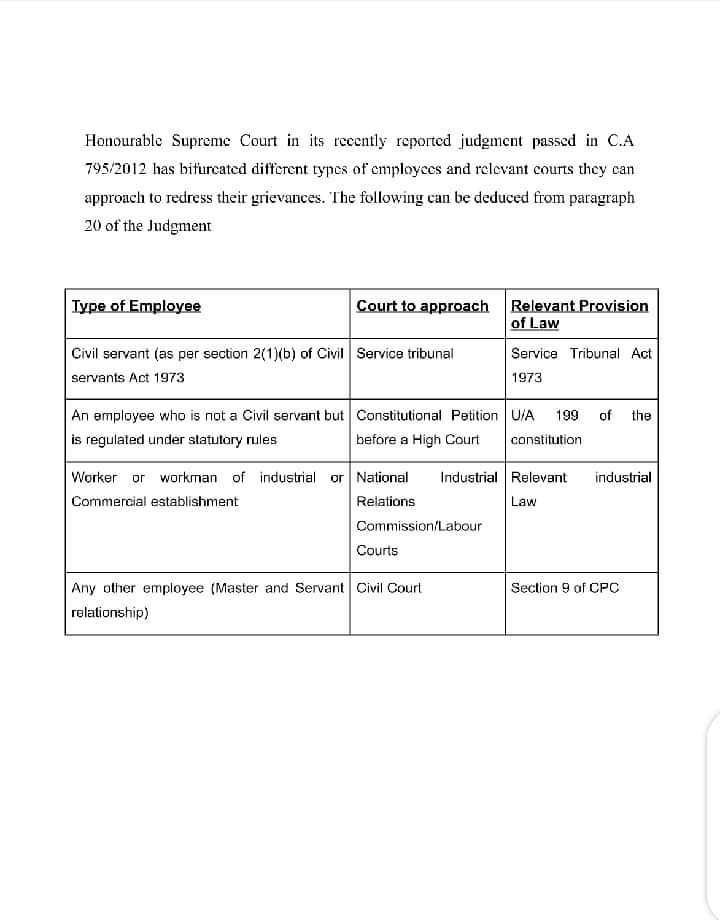In a recent decision, the Honourable Supreme Court, in its recently reported judgment in C.A. 795/2012, has provided much-needed clarity on the redressal mechanisms available to different categories of employees. This judgment bifurcates various types of employees and delineates the relevant courts they can approach to seek remedies for their grievances. This blog post summarises the key findings from paragraph 20 of the judgment, offering guidance to employees and legal practitioners alike.This judgment can be accessed here.
Understanding the Categories and Corresponding Forums
1. Civil Servants (as per section 2(1)(b) of the Civil Servants Act 1973)
Civil servants, defined under section 2(1)(b) of the Civil Servants Act 1973, are required to approach the Service Tribunal for grievance redressal. The Service Tribunal Act 1973 governs these proceedings, providing a specialised forum tailored to address the unique issues faced by civil servants.
2. Employees Regulated Under Statutory Rules (Non-Civil Servants)
For employees who are not classified as civil servants but are regulated under statutory rules, the appropriate forum is a Constitutional Petition before a High Court. This is in accordance with Article 199 of the Constitution. Such employees benefit from the constitutional protection that allows them to seek judicial review of administrative actions.
3. Workers or Workmen of Industrial or Commercial Establishments
Workers or workmen employed in industrial or commercial establishments should direct their grievances to the National Industrial Relations Commission (NIRC) or Labour Courts. These forums are established under relevant industrial laws, which provide specialised adjudication mechanisms for labour disputes, ensuring that workers’ rights are upheld in an expeditious and effective manner.
4. Other Employees in a Master and Servant Relationship
Employees who do not fall into the aforementioned categories and are in a traditional master and servant relationship can seek redressal in Civil Courts. Section 9 of the Civil Procedure Code (CPC) allows these employees to file suits in civil courts for any grievances arising out of their employment contracts.
Implications of the Judgment
This judgment by the Supreme Court is significant as it delineates clear pathways for employees to seek justice, thereby reducing ambiguity and potential jurisdictional conflicts. It ensures that each type of employee has a designated forum that is best suited to address their specific grievances.
For civil servants, the specialised Service Tribunal offers a focused approach to their unique issues, while the High Courts provide constitutional oversight for those governed by statutory rules. The NIRC and Labour Courts are equipped to handle the complexities of industrial relations, and the civil courts offer a general remedy for other employment disputes.
Conclusion
The bifurcation of forums for employee grievances, as outlined by the Honourable Supreme Court, enhances the efficacy of the judicial process in employment disputes. By directing employees to the appropriate courts, this judgment not only streamlines the redressal process but also ensures that employees receive the most relevant and specialised judicial attention.
For legal practitioners and employees, understanding these distinctions is crucial. It enables them to navigate the legal landscape effectively and ensures that grievances are addressed in the most suitable forum, thereby fostering a more efficient and just resolution process.

 The Honourable Supreme Court’s decision in C.A. 795/2012 represents a pivotal moment in the landscape of employee grievance redressal mechanisms. This judgment meticulously categorises different types of employees and specifies the appropriate forums for addressing their grievances, thereby providing much-needed clarity and reducing potential jurisdictional conflicts.
The Honourable Supreme Court’s decision in C.A. 795/2012 represents a pivotal moment in the landscape of employee grievance redressal mechanisms. This judgment meticulously categorises different types of employees and specifies the appropriate forums for addressing their grievances, thereby providing much-needed clarity and reducing potential jurisdictional conflicts.